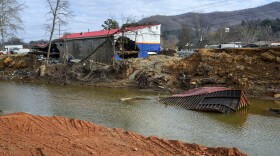North Carolina State University is suing agrochemical company Monsanto, blaming it for toxic chemicals found in one of its educational buildings. In 2023, N.C. State shut down its psychology academic building, Poe Hall, after it tested positive for PCBs.
PCBs are toxic and odorless chemicals that the Environmental Protection Agency has linked to adverse health effects like cancer.
The university claims Monsanto used construction materials containing PCBs to build Poe Hall back in 1971. It also accused the company of marketing the PCB mixtures as nontoxic at the time. The EPA banned the manufacturing of PCBs in 1979 but warns on its website that the chemicals could still be present in commercial materials produced before then.
N.C. State claims PCBs from Monsanto's materials were spread throughout Poe Hall via the building's air conditioning system.
“Monsanto issued no public warnings or instructions addressing these issues or the associated health risks with its PCB products and, in public communications, denied or concealed the existence of those hazards," the university said in its lawsuit and a press release.
In a statement sent to WUNC, Monsanto denied N.C. State's claims and said they "lack merit."
"Monsanto discontinued its production of bulk industrial PCBs nearly five decades ago, conducted hundreds of studies on PCB safety, and provided appropriate warnings to its sophisticated industrial customers based on the state-of-the science at the time," said a company spokesperson. "Furthermore, any PCB-containing building products used in Poe Hall or other buildings on campus were manufactured, sold and installed by sophisticated third-parties, and maintained by the University.”
Monsanto also told WUNC it will respond to N.C. State in court "in due course." The company was acquired by drug company Bayer in 2018.
In its lawsuit, N.C. State is seeking damages to cover Poe Hall's multimillion dollar reconstruction, its attorneys' fees, and punitive damages. UNC System President Peter Hans said the university and taxpayers are facing "at least a nine-figure bill" to restore the building.
The UNC Board of Governors has already approved a more than $3 million reallocation for Poe Hall's PCB cleanup.
N.C. State also wants Monsanto to be liable for any personal injury claims. The university said several personal injury lawyers arranged visits to Poe Hall for toxic chemical sampling and to take photos. Hundreds of people told broadcast news outlet WRAL they developed cancer after spending time in Poe Hall.
The National Institute for Occupational Safety and Health is currently conducting a health hazard evaluation into Poe Hall. It started at the request of N.C. State last year to investigate potential cancer clusters. The university says it will publicly release the report when it's finished.
WUNC partners with Open Campus and NC Local on higher education coverage.








